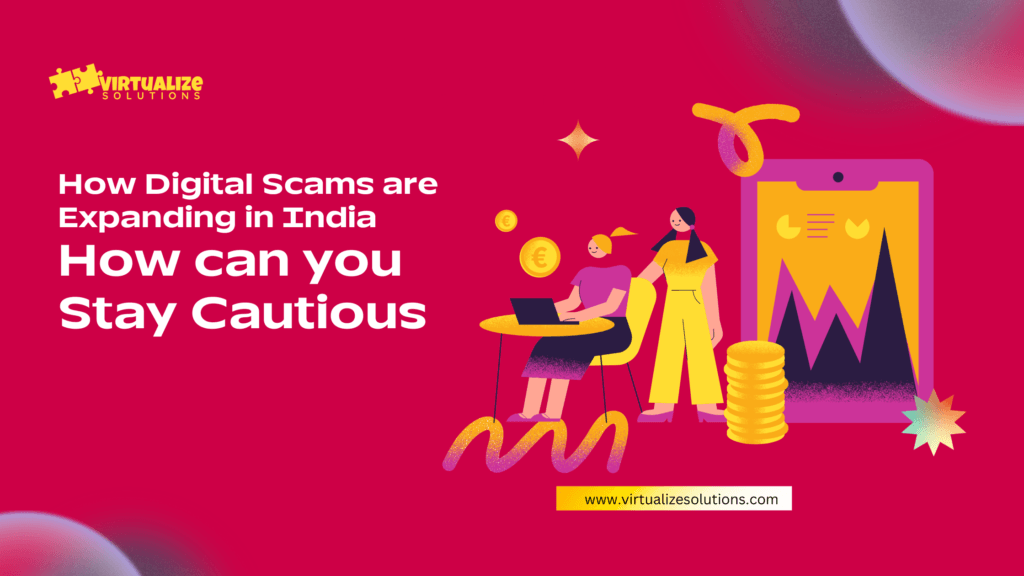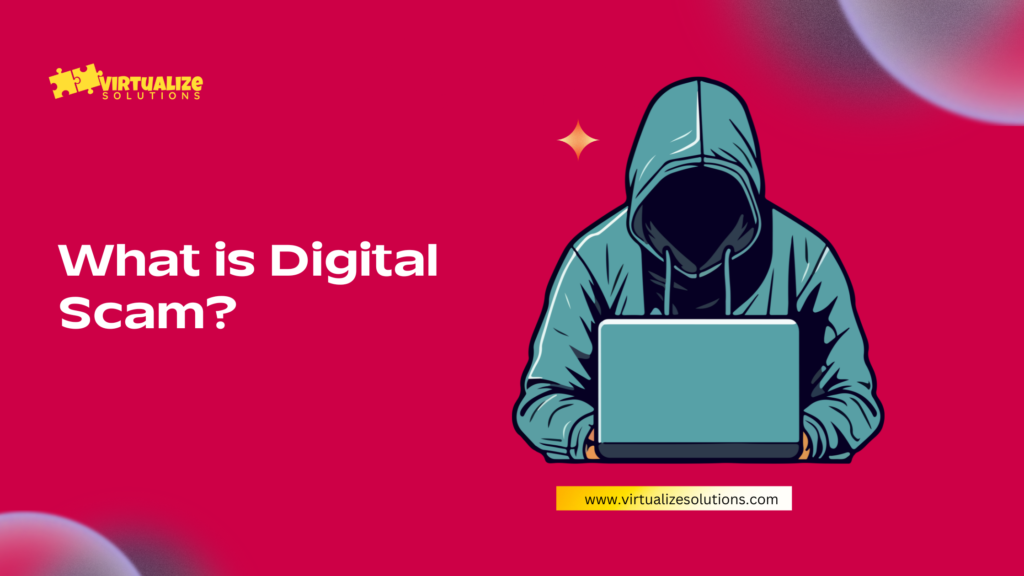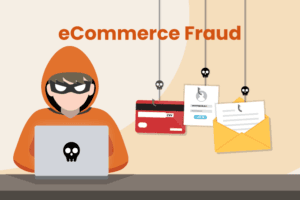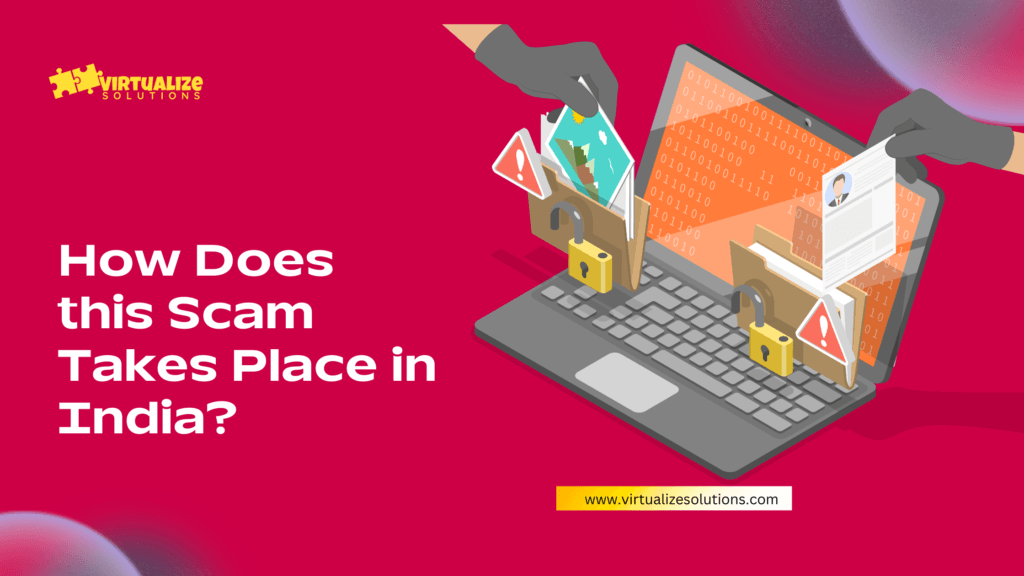
In India, digital scams are spreading like wildfire. Hundreds of examples of people losing their money, personal information as victims of online scams have been documented in recent years. Social media marketing is also used as a tool by scammers now a days. The intricate web that fraudsters are creating to deceive people and take their money is even more worrisome. These days, scammers do more than just lure people in; they even threaten their victims, emotionally draining them to the point where victims transfer money out of terror. An example of an online fraud in which victims are threatened is the “digital arrest scam.”
What is Digital Scams?

Any online fraud that involves the use of digital devices (such as computers, tablets, and smartphones) and causes the victim to lose money, passwords, or personal information.
India has seen a surge in cybercrime, with the digital arrest scam being one of the most recent and concerning scams. Imagine getting a call from someone claiming to be a senior police officer and accusing you of money laundering or drug smuggling. This is exactly the predicament that many Indians are in at the moment. Scammers are putting gullible people under “digital arrest,” forcing them to send significant quantities of money, using phony ID cards, false accusations, and sophisticated virtual interactions.
A few well-known internet frauds are:
E-Commerce Scams

Scammers may approach you via email or social media with an OFFER, and they will place fake ads on e-commerce sites. The scammer advertises the product at a low price, significantly less than similar products, in an attempt to entice the victims. The fraudster disappears and stops responding after the payment is completed, and the item in reality does not even exist.
If a product, service, or other item’s quoted price seems too good to be true, it most likely isn’t. Do not proceed with the deal if you are unsure. Use the exact words from the advertisement to conduct an online search; this is how many well-known frauds can be located. Always review the cancellation and refund policies.
Advice for internet shoppers
Steer clear of any agreement where the dealer requests payment via odd ways, such as a pre-loaded card or digital currency like Bitcoin. Recovering funds sent in this manner is extremely challenging.
Advice for online sellers
The “overpayment scam” is the most common type of scam that targets vendors. The scammer will use a cheque for a higher amount than was agreed upon and blame it on human mistake. Before you find out that their first cheque bounced, they will then ask you for an online bank transfer return of the excess money. Both the commodity sold and the money are lost by the vendor.
Investment Scams

Most of the time, the scammers use the phone or e-mail to aggressively contact their victims. A red flag should already be raised by this stranger’s uninvited contact. The individual will deceive the victim into thinking that the offer is unique and an irresistible opportunity by offering the ability to make a sizable profit quickly. The use of paid Facebook advertisements might lend credibility to phony websites that promote fraudulent investment possibilities, leading you to believe that the opportunity is real.
Online scammers might suggest several different schemes, such as investing in precious metals, silver and gold, coins that are rare, stamps, cryptocurrency. In order to take advantage of the offer, victims are required to pay a fee up ahead. The fraudster “disappears” after the money is paid and can no longer be reached.
Phishing

Phishing is the deceptive practice of posing as a reliable organization in order to steal private information or data, including credit card numbers, usernames, and passwords. E-mail marketing, social networking platforms, scam websites (such as phony online shops), mobile phones with various online apps, text messages, phone calls, and posing as a technician, bank clerk, police officer, company representative, etc. are some of the ways that data can be stolen.
Important information about the victim is what the scammer aims to obtain Bank codes, credit cards number, access codes to online portal, individual identification number the most frequent scenario involves the victim receiving a forged email posing as his bank asking him to verify his credentials. The email contains a link that will take the victim to a phony website that looks just like the real one, and if the victim enters his credentials, the information will be stolen.
Job Offer Scams

You receive an unsolicited email offering a job as a mystery shopper or something similar, usually not in your field of expertise. You receive payment by cheque or money order when you agree, which is more than what your “employer” offered. After you are requested to return the difference, you find out that the original cheque or money order was fraudulent, and you are no longer able to access the funds you provided to your fictitious employer.
Charity Fraud Scams

Scammers attempt to take advantage of the public’s emotions following significant natural catastrophes or well-publicized tragedies. In order to raise money that never reaches the victims, they create phony contribution websites and accounts before crafting an E-mail, because they prey on people’s empathy and generosity.
Lottery Scams

An E-mail telling you that you have won a little lottery with a significant payment is sent to you. In order to release your wins, you can also be required to pay a small amount. After being prompted to provide personal information for verification, you are subsequently the victim of identity theft, and the money you provided is lost.
Beneficiary Scams

Someone sends you an e-mail asking to transfer some funds as soon as possible. These E-mails are occasionally sent by individuals posing as prominent businesspeople or officials who indicate they have millions of dollars to transfer abroad and would like your assistance in return for a share of the earnings.
PC Repair Scams

You get a call from someone claiming to be from “Microsoft” or another big software company, saying they can cure PC problems like poor Internet speeds. This is an example of a scam that begins in the physical world and swiftly spreads to the internet. When the E-mail reaches your inbox, you download a remote access tool because it seems useful, allowing scammers to take over your computer.
How Does this Scam takes Place in India?

The digital scam usually starts with a call, usually from scammers posing as law authorities or well-wisher. These scammers mislead their victims using advanced tactics.
The fraud usually goes like this:
Fabricated allegations

An E-mail, WhatsApp message, or SMS saying that the recipient’s name or phone number is connected to severe crimes like drug trafficking, money laundering, or tax evasion. In order to prevent being put under “digital arrest,” the message tells the recipient to phone a certain number.
Video call intimidation:

After a victim answers, scammer use Skype or WhatsApp to start a video call while posing as representatives of the government, the Central Bureau of Investigation (CBI), the Narcotics Control Bureau (NCB), or Customs. To create a realistic scene, they include background noise, government objects, and uniforms.
Virtual arrest:

The victim is informed that they are being placed under virtual arrest. They are told to withdraw and do as the scammer asks, which typically entails moving funds between several bank accounts or cryptocurrency wallets.
Monetary Transfer:

When victims are insisted to “pay a fine,” or transfer money to clear their name, many comply out of fear and extreme pressure.
How to Protect Yourself From Such Scam

Fortunately, there are easy actions people can take to avoid being victims of this type of scam.
1. Remain Calm and Don’t Panic:
Scammers use panic and terror to control their victims. You can step back and consider the matter critically if you maintain your composure.
2. Record the Interaction:
Make an effort to record any questionable calls or messages you receive. If at all feasible, record the discussion or take screenshots. When reporting the scam to the authorities, this evidence will be essential.
3. No government agency would threaten you online:
Keep in mind that no law following police or government agency would threaten to arrest you or demand money via the internet. Such threats are a warning sign that you are interacting with a scammer.
4. Contact the Cybercrime Helpline:
Call the national cybercrime helpline at 1930 if you think you’re being scammed. Authorities can take action to find the culprits and assist you in determining your next course of action.
5. Keep your personal information private, especially your bank account information:
Don’t give out money or personal information to somebody you don’t know or can’t trust.
Unexpected and unwanted SMS or E-mail links should never be opened unless the sender is completely trustworthy. Never divulge bank ID codes, passwords, or other login information online, over the phone, or in any other situation. Neither the bank nor the police ever ask for these details. SCAMMERS ONLY ASK FOR THAT INFORMATION! Notify your bank’s customer service right away and report it to the police if you or a loved one has fallen victim to phishing and you believe that a scammer has obtained your bank credentials.
6. Always double check claims and ask for documents
Independently verify information pertaining to legal claims. Verify the veracity of any claims by getting in touch with the appropriate legal or law enforcement authorities in your area.
7. Only communicate via official channels:
Only official channels are used by legitimate law enforcement. If in doubt, use publicly accessible contact information to independently get in touch with the appropriate agency.
8. Keep yourself updated:
Familiarize yourself with common indications of scammers, which include unsolicited calls for money, threats of immediate legal action, and requests for payment through unusual means.
9. Educate Yourself and Others:
The strongest defense against frauds is awareness. Learn about the typical forms of cyber fraud and assist in educating those who might not be as knowledgeable.
CONCLUSION
Cyberattacks and digital scam can never leave the internet space. To use the internet safely, you only need to use the newest technology and take the appropriate precautions. Never leave the passwords kept on the browser, regardless of the purpose of the app or website. Additionally, avoid clicking on offers that seem too good to be true when you’re online. Typically, these are spam E-mails designed to gather and exploit your personal information for illegal purposes.
These scams take advantage of people’s trust, anxiety, and bewilderment, but they may be prevented with the correct information and safety measures. Keep in mind that no reputable authority will make threats of arrest or demand money online. Remain composed, record any questionable encounters, and notify the proper authorities of the crime. We may prevent ourselves and our loved ones from becoming victims of these scams by remaining aware and alert.
You can visit our Learning Centre or get a phishing risk assessment for your company if you’d like to learn more about social media marketing security.
1 thought on “How Digital Scams are Expanding in India; How can you Stay Cautious”
What a gem I’ve discovered! The thoroughness of your research combined with your engaging writing style makes this post exceptional. You’ve earned a new regular reader!